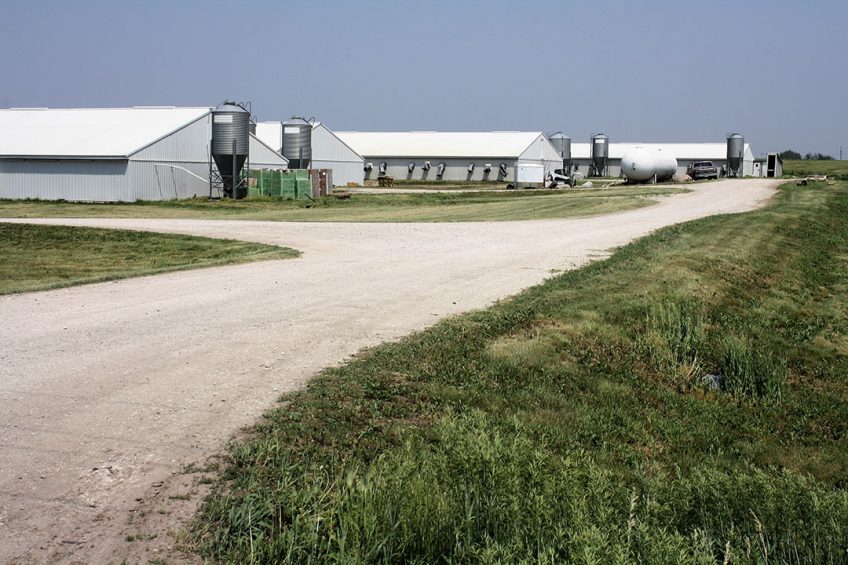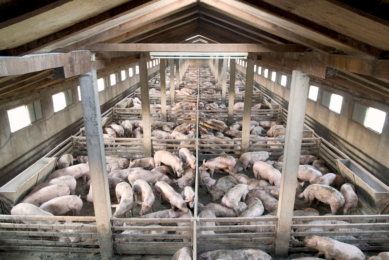Covid-19: Crisis in US pork sector is not over yet

US pig processing has held steady at 95% of normal capacity for about 6 weeks, but pig farmers are now calling on the federal government for financial help to deal with pandemic-related losses. These are the developments in North America this week.
On Monday, the US National Pork Producers Council (NPPC) once again highlighted the extensive damage caused to the US pig farming sector by Covid-19, and urged Congress to provide swift financial aid in order to save many farms at extreme risk of going under.
Pig losses pile up
US pig farmers have had to face many costs as packing plant capacity dropped in the spring, costs associated with euthanasia, disposal and donation of pigs. They have also had to contend with lower prices.
An estimated 2 million hogs are still backed up at this point on US farms according to a new analysis by Steve Meyer, an economist with Kerns & Associates. Meyer also noted that based on lean hog futures prices on March 1 and July 10 and actual hog prices in the interim, revenue from hog sales has been reduced by roughly $ 4.7 billion for US pig farmers.
The NPPC is warning that if additional packing plant disruptions occur in the weeks and/or months to come due to Covid-19 worker infections, “the number of hogs backed up on farms will swell precipitously.”
NPPC: More emergency relief required
To deal with losses already incurred and likely additional future losses, the NPPC is asking Congress to provide more emergency relief for hog farmers. Pig farmers did receive good news earlier in July when several US senators from Oklahoma, North Carolina and Iowa introduced the RELIEF for Producers Act of 2020, which provides some compensation for farmers who have been – and continue to be – forced to euthanise or donate animals that cannot be processed into the food supply as a result of Covid-19, among other provisions.
Slaughter plant capacity
In an interview with Pork Business, Meyer said this week that the US pork industry would have slaughtered about 1.1 million more pigs from June 1 to about mid-July than it would have without Covid-19. However, while slaughter capacity in US meat packing plants has rebounded significantly since the spring when it peaked at 40% idleness, Meyer said the industry “is still hovering around 5% idle capacity,” and adds that “we think that loss is more or less permanent.”
Meyer expects the backlog of pigs to expand to as much as 1.6 million by the end of August and to 2.5 million by the end of the year.
 Dave Mensink (pictured), president of the Minnesota Pork Producers Association (MPPA), weighed in on Wednesday July 22, noting that hog farmers in Minnesota and beyond “are in crisis,” and calling the backlog of pigs “daunting.” He believes Congress must “come together quickly on a final Covid-relief bill,” and calls on the industry to speak with “a resounding, unified voice.”
Dave Mensink (pictured), president of the Minnesota Pork Producers Association (MPPA), weighed in on Wednesday July 22, noting that hog farmers in Minnesota and beyond “are in crisis,” and calling the backlog of pigs “daunting.” He believes Congress must “come together quickly on a final Covid-relief bill,” and calls on the industry to speak with “a resounding, unified voice.”‘Pass the Pork’ moves forward
The ‘Pass the Pork’ programme that has enabled Iowa pig farmers to help bring nearly 200,000 servings of pork to Iowans in need (through donating pigs that would have been euthanised) is now entering a new phase. The programme has been running for about 3 months and has funded the processing of over 450 pigs.
Now, the processing of donated pigs will occur at the Iowa State University (ISU) Meat Laboratory and the costs will be covered through funding of the CARES (Coronavirus Aid, Relief, and Economic Security) Act. Terry Houser, ISU Extension Meat Specialist, says “we are very grateful for the opportunity to be able to help those in need while training students at the same time.”

Covid-19 Up-date
What impact is the pandemic having on the global pig sector and how are they dealing with it.
Also in Iowa, pig farmers forced to euthanise and dispose of market-ready and weaned pigs because of supply chain disruptions caused by Covid-19 are now eligible for a fourth round of funding through the Iowa Disposal Assistance Program.
Efforts to mitigating virus spread
News agency Reuters reported mid-July that 2 of the world’s main meatpackers have either installed or are testing air-cleaning equipment in some of their US plants, in order to better protect workers from contracting Covid-19. This may have been prompted, in the case of JBS SA, by a recent lawsuit against the firm started by the family of a JBS USA packing plant worker who died from Covid-19.
JBS USA has now installed ultraviolet (UV) air sanitation equipment (using specific wavelengths of light) and also ‘plasma’ technology (using bipolar ionisation) in some of its packing plants. Tyson Foods is doing “extensive research” on air flow and testing UV systems across several plants. Reuters states that there is no conclusive evidence any of these technologies will reduce the risk of Covid-19 transmission.
However, these actions “underscore the mounting pressure to protect workers in the US meat industry, which has seen more than 16,000 plant employees in 23 states infected with Covid-19 and 86 worker deaths.”
Funding for Canadian food processors
On Monday July 20, the governments of Canada and the province of Manitoba announced a new CAN $ 3 million cost-share programme (US$ 2.2 million) to support projects in Manitoba that will help agricultural processors there mitigate the spread and impact of Covid-19.
The programme will provide financial assistance for personal protective equipment and sanitation supplies, business continuity practices, training and resources, and resources needed to adapt production processes for social distancing and other precautions. The governments will contribute a maximum of 50% of eligible project costs, up to CAN $ 25,000 (US$ 19,000) per applicant.











